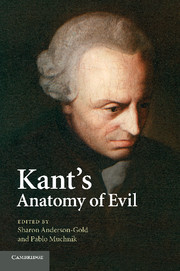Book contents
- Frontmatter
- Contents
- Contributors
- List of abbreviations
- Introduction
- 1 Kant's “Metaphysics of Permanent Rupture”: Radical Evil and the Unity of Reason
- 2 Kantian Moral Pessimism
- 3 Kant, the Bible, and the Recovery from Radical Evil
- 4 Kant's Moral Excluded Middle
- 5 Evil Everywhere: The Ordinariness of Kantian Radical Evil
- 6 An Alternative Proof of the Universal Propensity to Evil
- 7 Kant and the Intelligibility of Evil
- 8 Social Dimensions of Kant's Conception of Radical Evil
- 9 Kant, Radical Evil, and Crimes against Humanity
- 10 Unforgivable Sins? Revolution and Reconciliation in Kant
- Select bibliography
- Index
3 - Kant, the Bible, and the Recovery from Radical Evil
Published online by Cambridge University Press: 04 May 2010
- Frontmatter
- Contents
- Contributors
- List of abbreviations
- Introduction
- 1 Kant's “Metaphysics of Permanent Rupture”: Radical Evil and the Unity of Reason
- 2 Kantian Moral Pessimism
- 3 Kant, the Bible, and the Recovery from Radical Evil
- 4 Kant's Moral Excluded Middle
- 5 Evil Everywhere: The Ordinariness of Kantian Radical Evil
- 6 An Alternative Proof of the Universal Propensity to Evil
- 7 Kant and the Intelligibility of Evil
- 8 Social Dimensions of Kant's Conception of Radical Evil
- 9 Kant, Radical Evil, and Crimes against Humanity
- 10 Unforgivable Sins? Revolution and Reconciliation in Kant
- Select bibliography
- Index
Summary
A familiar feature of Kant's religious thought is his moral theory of biblical interpretation. His position enjoys a capsule statement in Kant's reaction to the contemporary biblical critic J. D. Michaelis, who comments in the following way on a prayer for revenge in Psalm 59: “The psalms are inspired; if they pray for revenge, then it cannot be wrong: We should not have a holier morality than the Bible.” In his rather wry response, Kant notes: “I pause here at this last statement and ask whether morality must be interpreted in accordance with the Bible, or the Bible, on the contrary, in accordance with morality.”
Embedded in Kant's obviously rhetorical question is his utter lack of interest in the running debates over the Bible's historical and literal accuracy that were consuming the scholarly energies of the day. Referring to such debates, Kant would argue that we “should not quarrel over an issue unnecessarily, and over its historical standing, when, however we understand it, the issue does not contribute anything to our becoming a better human being” (R 6: 43). Properly read and interpreted, the Bible simply reminds us of what we already know, since morality for Kant needs no instruction from the “outside.” In particular, we need no assurance regarding its historical accuracy to rely on such moral lessons that the Bible may convey.
- Type
- Chapter
- Information
- Kant's Anatomy of Evil , pp. 57 - 73Publisher: Cambridge University PressPrint publication year: 2009
- 2
- Cited by

